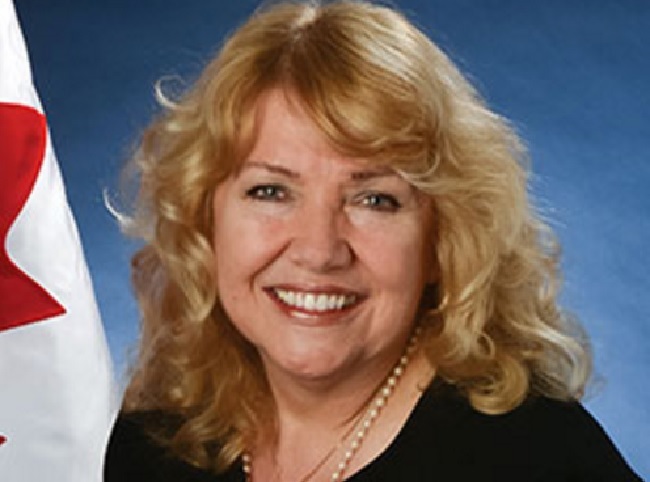In an open letter, Conservative Sen. Lynn Beyak is calling for Indigenous Canadians to trade in their status cards for Canadian citizenship.

The letter, posted to her website on Sept. 1, also once again states her opinion that Canada’s residential school system was not all bad – a position that Indigenous groups and other politicians severely criticized when she expressed it in a speech in the Senate in March.
In that speech, she said that she was speaking for the “well-intentioned men and women and their descendants” whose “remarkable works, good deeds and historical tales in the residential schools go unacknowledged” and get overshadowed by negative reports.

These remarks ultimately cost her her seat on the Senate’s committee on aboriginal peoples, but judging by the letter, she has not changed her position.
“A small number of aboriginals found the schools bad and a slightly smaller number found them good. Only 1 in 3 Indigenous children ever attended them. Very few were torn from their parents’ arms, but rather were enrolled by loving parents who were away trapping and trading for months on end, and who wanted to prepare their children for the future,” she wrote.

Beyak goes on to write that the Indian Act is unnecessary. “We have a Charter of Rights and Freedoms for all Canadians.”

Get daily National news
“None of us are leaving, so let’s stop the guilt and blame and find a way to live together and share,” she wrote. “Trade your status card for a Canadian citizenship, with a fair and negotiated payout to each Indigenous man, woman and child in Canada, to settle all the outstanding land claims and treaties, and move forward together just like the leaders already do in Ottawa. All Canadians are then free to preserve their cultures in their own communities, on their own time, with their own dime.”
In a follow-up statement sent to parliamentary reporters on Sept. 14, Beyak said that media coverage had failed to highlight that she also wants victims of residential schools to be compensated immediately and pointed to the recommendations of the 1969 White Paper on Indian Policy as a possible way forward.
“What we have been doing is obviously not working, spending billions of dollars annually, yet filthy water and inadequate housing (are) still a reality on too many reserves,” she wrote.
Trading a status card for a Canadian citizenship would not be much of a deal for Indigenous people, Dr. Linc Kesler, director of UBC’s First Nation House of Learning and senior advisor to the president on Aboriginal affairs, told Global News.
“Indigenous people in Canada already have citizenship,” he said.
“So there’s not a trade to be made.”
In her initial letter, Beyak also said that a “small number of Aboriginals found the schools bad and a slightly smaller number found them good.”
Kesler found those remarks surprising, given the “weight of evidence” that suggests otherwise.
READ MORE: Residential school system contributed to current First Nations diabetes epidemic: study
“We did have the Truth and Reconciliation Commission (TRC) operating for more than five years,” he said. “They produced an incredibly extensive report, we know that a significant number of students died in the schools, we know there was systemic malnutrition that no doubt contributed to their deaths.
“At the end of all that to say they were kind of good and there were a few bad experiences flies in the face of the evidence.”
In late August, the federal Indigenous and Northern Affairs Canada portfolio was divided into two sections in a process that will ultimately see the long-standing ministry dissolved and replaced.
Perry Bellegarde, national chief of the Assembly of First Nations, called these changes “significant steps” toward restoring and revitalizing the relationship between First Nations and the Crown.
— With files from Tania Kohut and Monique Scotti






Comments
Want to discuss? Please read our Commenting Policy first.